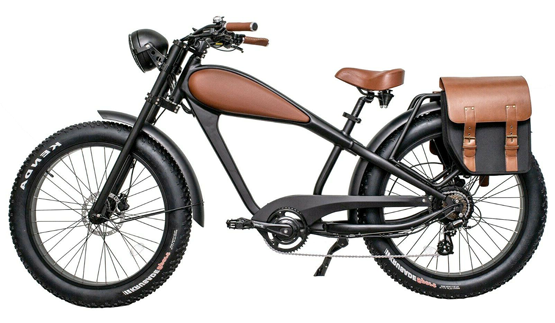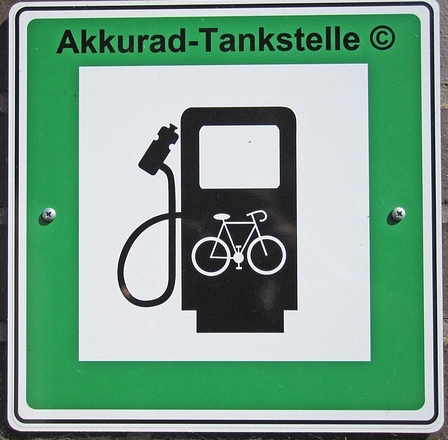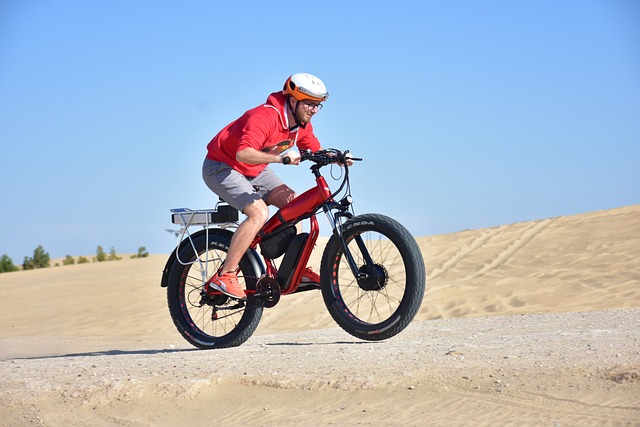Electric Bicycle
AKA ‘Ebike’
Electric Bicycles: Harnessing Power and Pedals
An electric bicycle, or e-bike, combines the benefits of traditional cycling with the power of an electric motor.
At the crossroads of innovation and sustainability, e-bikes represent a revolution in personal transport, offering a healthy, fun, and eco-friendly way to commute or explore.
How an Electric Bike Works
Electric bicycles, also known as e-bikes, utilize a sophisticated synergy between conventional cycling mechanics and modern electric assistance.
Here’s an overview of how these innovative machines work:
Pedal and Power
At its core, an e-bike operates like a regular bicycle.
You pedal to move, steer with the handlebars, and brake to stop.
The key difference lies in the addition of an electric motor.
As you pedal, the motor comes to life, offering a level of assist that reduces the strain on your legs.
This system, often referred to as ‘Pedal Assist’, allows you to cycle further and faster with less effort.
The Motor
The electric motor on an e-bike can be positioned in a few different places, commonly either in the hub of the rear wheel (hub motor) or between the pedals (mid-drive motor).
When you start pedaling, sensors detect the motion and initiate the motor to provide assistance.
The level of assistance can usually be adjusted through a controller located on the handlebars.
The Controller
An on-board controller allows you to adjust how much assistance the motor provides as you pedal, usually ranging from none to a lot.
Many electric bikes also feature a display panel on the handlebars showing vital information such as the battery level, speed, distance traveled, and the level of assist selected.
The Battery
The motor is powered by a rechargeable battery.
Most e-bikes use lithium-ion batteries due to their light weight and high energy density.
Battery capacity, often measured in Watt-hours (Wh), determines the bike’s potential range—the distance you can cover before needing to recharge the battery.
The range varies widely depending on factors such as the level of assist, the weight of the rider, the terrain, and the battery capacity.
In essence, electric-bicycles provide the flexibility to choose how much or how little effort you want to exert, making cycling more accessible to a wider range of people and opening up new possibilities for using a bicycle for transport, exercise, or leisure.
Recharging the Battery
Recharging an electric bicycle is a straightforward process akin to charging a laptop or a smartphone.
The battery on an e-bike can typically be recharged in one of two ways:
By plugging it directly into a power outlet while it’s still attached to the bike, or by removing the battery from the bike and charging it separately.
The latter option is particularly convenient if you live in an apartment or have to store your bike somewhere without access to a power outlet.
The charging process involves plugging one end of the charger (which usually comes with the e-bike) into the battery and the other end into a standard electrical outlet.
The battery contains a built-in management system that ensures it charges safely and efficiently.
The length of time it takes to fully charge an e-bike battery varies depending on its capacity and the power of the charger.
Typically, it can take anywhere between 3 to 6 hours for a complete charge from zero to full. Some high-capacity batteries may take a bit longer.
It’s important to note that lithium-ion batteries (the type commonly found in e-bikes) have a longer lifespan if they’re not regularly drained to zero before recharging.
It’s often recommended to start recharging the battery when it’s about 20% full, known as the 80/20 rule.
As for the cost, e-bikes are very energy-efficient.
The cost of electricity to charge an e-bike is just a fraction of the cost of fuel for a car over the same distance. The exact cost depends on the local cost of electricity but is generally less than a few cents per mile.
Over time, the capacity of batteries gradually decreases.
This means that the range you can travel on a full charge will slowly reduce.
The lifespan of a battery typically ranges from 2 to 5 years depending on usage and care.
When the battery eventually needs replacing, old e-bike batteries should be recycled at an appropriate recycling facility.
Different Types of Electric Bicycle
The world of electric bicycles is as diverse as it is thrilling.
This innovative space embraces every rider’s unique needs and preferences, bringing to life a variety of designs, each with its own distinct cycling experience.
Remember, the world of e-bikes is expansive and continuously growing.
The most critical factor is to choose a style that resonates with your lifestyle and cycling goals.
Whether it’s for recreation, exercise, commuting, or a blend of all three, there’s an e-bike out there for everyone.
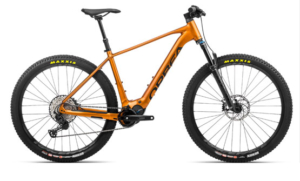 Mountain Electric Bicycles (eMTBs)
Mountain Electric Bicycles (eMTBs)
For those who live for the thrill of off-road adventures, eMTBs are the perfect companions.
They boast sturdy frames, high-torque motors, and heavy-duty suspension systems that absorb shocks and provide stability on rugged trails.
Moreover, their grippy, wide tires offer exceptional traction on loose surfaces, making them the perfect bikes for exploring nature.
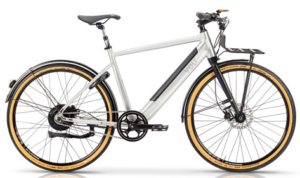 City or Urban Electric Bicycle
City or Urban Electric Bicycle
As the name suggests, these electric bikes are designed for city dwellers.
Their priority is to make commuting in an urban environment as easy and efficient as possible.
They often feature comfortable upright riding positions, fenders to ward off splashes and debris, and carriers for luggage.
Some even come with integrated lighting systems for enhanced safety.
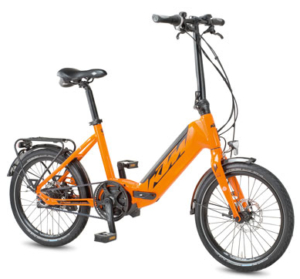 Folding Electric Bicycle
Folding Electric Bicycle
A boon for those with limited storage space or multi-modal commuters, folding e-bikes are designed for maximum convenience.
These e-bikes have hinges or joints in the frame that allow them to fold down into a compact size.
This design makes it easy to carry them onto public transport or stow them away at home or in the office.
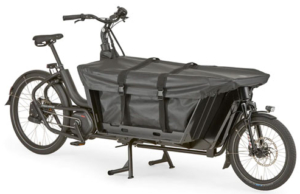 Cargo E-Bike
Cargo E-Bike
For those who need to haul groceries, run errands, or even transport kids, cargo e-bikes are the answer.
These e-bikes come with extra-large racks or built-in baskets and boast reinforced frames and high-capacity batteries to handle the extra weight.
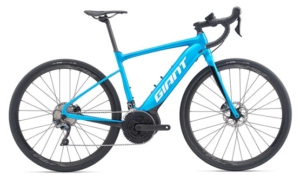 Road Electric Bicycle
Road Electric Bicycle
Road electric-bicycles combine the speed and efficiency of traditional road bikes with the added boost of an electric motor.
They feature drop handlebars for multiple hand positions, narrower tires for less rolling resistance, and lightweight frames for better agility and speed.
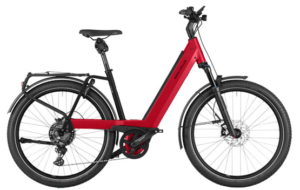 Touring Electric Bicycle
Touring Electric Bicycle
Designed for long-distance riding, touring e-bikes come with large capacity batteries and are built to carry heavy loads.
They typically have a comfortable geometry for long hours in the saddle, and mounts for pannier racks and water bottles.
Fat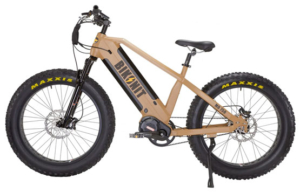 E-Bike
E-Bike
These are specialized bikes equipped with oversized tires, often 4 inches or more in width, designed for low ground pressure to allow riding on soft, unstable terrain, such as snow or sand.
The electric assist in fat e-bikes is useful in overcoming the extra resistance from the wide tires.
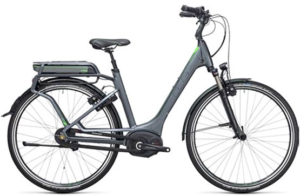 Hybrid Electric Bike
Hybrid Electric Bike
A cross between road and mountain bikes, hybrid e-bikes are all about versatility.
They’re perfect for riders who want to mix their commute with some leisurely weekend rides.
With moderately wide tires and an upright riding position, they offer a comfortable ride, regardless of the terrain.
Step-Through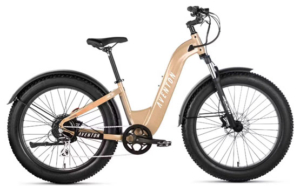 Electric Bicycle
Electric Bicycle
Step-through e-bikes feature a low or absent top tube, making getting on and off the bike a breeze.
This design is popular among city riders, seniors, or riders with limited mobility, but anyone who prioritizes convenience might appreciate a step-through frame.
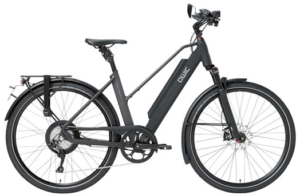 Speed Pedelecs
Speed Pedelecs
These e-bikes are for those with a need for speed.
They can assist the rider up to 28 mph, compared to the standard 20 mph limit on most e-bikes.
They’re great for long commutes, but keep in mind, they often have more legal restrictions.
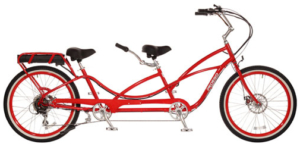 Tandem Electric Bikes
Tandem Electric Bikes
An electric take on the classic two-rider bicycle, tandem e-bikes allow two riders to experience the thrill of electric cycling together.
They are perfect for couples, visually impaired riders, or just two friends out for a fun ride.
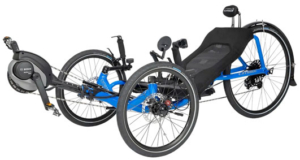 Recumbent Electric Bicycle
Recumbent Electric Bicycle
Recumbent bikes place the rider in a laid-back reclining position.
Electric versions of these provide a unique, comfortable riding experience and are a fantastic option for riders looking for a lower center of gravity or those who have back issues.
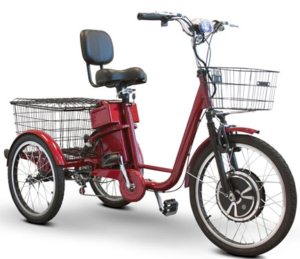 Trike Electric Bike
Trike Electric Bike
Offering unrivaled stability, trike e-bikes or electric tricycles are ideal for those who may find balancing on two wheels challenging.
These come in various forms, from upright trikes that look like traditional bikes with an extra wheel at the back, to recumbent trikes where you sit low to the ground with your legs in front of you.
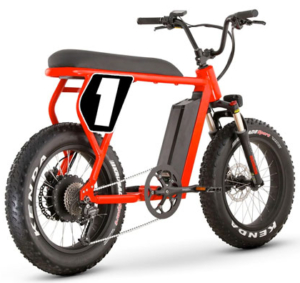 Moped-Style Electric Bike
Moped-Style Electric Bike
With their chunky tires, plush seats, and a decidedly retro style, moped-style e-bikes resemble old-school mopeds.
They often include features like powerful motors, long-range batteries, integrated lighting, and even cargo racks.
Pros and Cons of Buying an Electric Bike
Pros of an Electric Bicycle
Electric bikes come with a plethora of benefits that make them an attractive alternative to traditional bicycles and other modes of transportation.
Here are some pros of electric bikes:
Assisted Cycling
The primary advantage of e-bikes is their electric assist. This feature is a boon to those who love cycling but may struggle with hills, longer distances, or carrying heavy loads. The electric assist can make cycling more accessible to people of all fitness levels and ages.
Commute Friendly
E-bikes can be a great solution for commuters. They can often take advantage of bike lanes and paths, avoiding traffic congestion. Plus, the electric assist means you can arrive at your destination without being excessively sweaty.
Eco-Friendly
As a mode of transportation, e-bikes are environmentally friendly. They emit lower pollution per kilometer than motorcycles and cars.
Cost-Efficient
While the upfront cost of an e-bike can be higher than a traditional bike, they can save you money in the long run. E-bikes are cheaper to run when compared to cars and public transport. The cost of charging an e-bike battery is much less than spending on fuel.
Increased Range and Speed
With the assistance of the electric motor, you can travel further and faster than you might on a traditional bicycle. This opens up new possibilities for commuting, errands, and leisure rides.
Health Benefits
While the motor assists you, you’re still getting exercise. Regular cycling on an e-bike can improve cardiovascular health, improve strength, and help with weight management.
Fun Factor
Last but not least, riding an e-bike is fun. The extra boost can bring a sense of joy and adventure to your rides.
Cons of an Electric Bicycle
While electric bikes offer numerous benefits, there are also some considerations to keep in mind.
Here are a few potential drawbacks or cons of e-bikes:
Higher Initial Cost
Electric bikes are generally more expensive than traditional bicycles. The advanced technology and added components like the motor, battery, and electronic controls contribute to this cost.
Maintenance and Repairs
Along with their higher purchase price, e-bikes can be more costly to maintain. If the electrical system or battery needs repair, the cost could be higher than with a conventional bicycle. Also, not all bike shops are equipped to handle e-bike repairs.
Heavier Weight
Due to their motor and battery, e-bikes are heavier than traditional bikes, which can make them more challenging to transport or maneuver when the motor is not in use. This might also be a problem if you need to carry the bike up stairs or if the battery runs out mid-ride.
Battery Life and Replacement
Over time, the battery on an e-bike will degrade and need replacement. Depending on the battery type and quality, this might be a significant additional expense.
Limited Range
While an e-bike can cover greater distances than a regular bike for many riders, they still have a limited range. If your battery runs out and you don’t have access to a charging point, you’ll be left pedaling a much heavier bike than a traditional one.
Regulations and Restrictions
Laws regulating e-bikes vary by country, state, and even city. Some places classify them similarly to mopeds, which might require a special license, insurance, or restrict their use on bike paths.
Less Exercise
While e-bikes still provide a good workout, if your goal is high-intensity training, a traditional bike might be a better choice. The electric assist of an e-bike reduces the amount of effort you need to exert.
Considering these factors alongside the benefits will help you make an informed decision about whether an e-bike is the right choice for you.
Respected Manufacturers of Electric Bicycles
As the popularity of electric bicycles has surged, a multitude of manufacturers have emerged, each offering a unique blend of quality, innovation, and style.
Here are some respected names in the e-bike industry:
Trek
Known for high-quality bicycles of all types, Trek’s lineup of electric bikes is no exception. They offer a wide variety of electric bikes, from urban commuter e-bikes to electric mountain bikes.
Civibikes
Civibikes is a reputable brand known for producing high-quality electric bicycles. Their range of e-bikes is designed to provide efficient and eco-friendly transportation solutions for urban commuting and outdoor adventures.
Specialized
Another reputable bicycle manufacturer, Specialized has an impressive line of e-bikes known as Turbo e-bikes. These bikes are designed for various purposes, including mountain biking, commuting, and road cycling.
Giant
Giant offers an extensive range of e-bikes under its ‘Giant E+’ and ‘Liv E+’ (for women) series. These cover various cycling disciplines, including off-road and city commuting.
Riese & Müller
This German manufacturer is known for its premium, innovative e-bikes. They offer a wide range of models, including cargo e-bikes, touring e-bikes, and urban e-bikes.
Raleigh
With a history dating back over a century, Raleigh has a solid lineup of electric bikes that cater to a broad audience, from commuters to recreational riders.
Pedego
Pedego is a popular electric bike brand in the U.S, known for its comfortable, user-friendly cruiser-style e-bikes.
Rad Power Bikes
A leading direct-to-consumer brand, Rad Power Bikes is popular for its variety of e-bikes, including the RadRover fat-tire e-bike and the RadWagon cargo e-bike.
Vintage Electric
Vintage Electric is a company that specializes in the production of luxury electric bicycles. Based in California, USA, the company was founded in 2013 with the goal of creating beautiful, well-crafted electric bikes that blend vintage aesthetics with modern e-bike technology.
Cannondale
With a reputation for innovative design and high-quality bikes, Cannondale offers several electric models for road, mountain, and urban riding.
Brompton
For foldable e-bikes, Brompton’s Electric model adds a motorized boost to their popular folding design, making it an excellent option for urban commuters with mixed-mode journeys.
Cube
A leading European brand known for their wide range of high-quality bikes, Cube has a comprehensive line of e-bikes that includes models for mountain biking, touring, and urban commuting.
Haibike
This German brand is a pioneer in the e-bike industry, especially recognized for its e-performance and e-mountain bikes. Haibike’s e-bikes are acclaimed for their innovative design and top-notch technology.
Bulls
Another German brand, Bulls offers a wide variety of e-bikes, including mountain, road, and urban models. They’re well-regarded for their use of high-quality components and advanced technology.
Stromer
Stromer specializes in high-speed electric bikes, or “s-pedelecs”. Their e-bikes are known for their sleek, integrated designs and are often used for commuting longer distances.
Tern
Tern is known for their folding bikes, and they’ve brought their innovative folding designs to their line of electric bikes. Their GSD and Vektron models are particularly popular.
VanMoof
This Dutch manufacturer is known for its smart, stylish, and secure electric bicycles. VanMoof’s e-bikes feature an integrated design with a focus on anti-theft technology.
GoCycle
Based in the UK, GoCycle makes electric bikes with a unique, futuristic design. They’re lightweight, compact, and easy to fold, making them a great option for urban commuting.
Juiced Bikes
A U.S. brand, Juiced Bikes is known for their high-powered, long-range electric bikes. They offer a variety of models, from fat tire e-bikes to cargo e-bikes.
Brooklyn Bicycle Co.
Known for their stylish, vintage-inspired bikes, Brooklyn Bicycle Co. offers a few models of hybrid electric bicycles that combine a classic look with modern e-bike technology.
Bird
Known for their e-scooters, Bird has also entered the e-bike market with a stylish, accessible model known as the Bird Bike.
Yamaha
Known primarily for their motorbikes and marine products, Yamaha is also a prominent player in the e-bike world, with their electric bike systems used by many manufacturers. They also produce their own range of e-bikes.
KTM
The Austrian motorcycle and sports car manufacturer has a substantial e-bike range, including mountain, road, and city e-bikes. Known for their cutting-edge technology and high-quality builds, KTM is a trusted name in the electric bicycle industry.
EVELO
This U.S. company focuses exclusively on electric bikes. EVELO offers a wide range of models, from city bikes to cargo bikes, each with a unique blend of comfort, power, and versatility.
Gazelle
This Dutch company has been making bikes for over a century and has embraced the e-bike revolution. Gazelle’s e-bikes are known for their comfortable ride and high-quality craftsmanship.
BH Bikes
A Spanish company with a long history in the cycling world, BH Bikes offers an extensive range of electric bikes, from high-performance eMTBs to urban e-bikes.
Scott
This Swiss company is renowned for its sports and racing bikes, and its e-bikes are no exception. They offer a range of electric mountain, road, and hybrid bikes.
Merida
A Taiwanese brand with a strong reputation in the cycling world, Merida’s e-bike range includes models for mountain biking, commuting, and road cycling.
Orbea
This Spanish brand is known for its high-quality road and mountain bikes, and they’ve applied the same commitment to their electric bike range.
Moustache Bikes
This French company focuses solely on e-bikes, with a wide range of innovative, high-quality models.
GoCycle
Known for their portable and futuristic design, GoCycle’s e-bikes are designed to be lightweight, easy to fold, and perfect for urban commuting.

